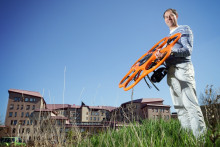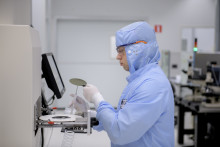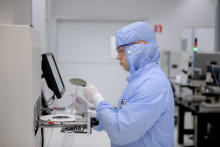During the seminar, held this afternoon in the Horst, Norman Kerle wants to make young scientists aware of the differences between traditional publishers and Open Access journals, as well as help them avoid common mistakes. The researcher explains why it is important to offer insight into the publishing process.
Why is it important for you to give a seminar on publishing research papers?
‘Publishing is an essential part of academic research, but it can be a hurdle for young scientists. I’m happy to share my experience and opinions. I expect my opinions to clash with the second speaker who works at Elsevier. Either way, I want to present my arguments and let everyone decide for themselves.’
Two experts
The seminar features two speakers: Norman Kerle and Anthony Newman. Norman Kerle is an ITC professor, Associate Editor of the Open Access journal Remote Sensing and editor of the Open Access journal Natural Hazards and Earth System Sciences. Anthony Newman is a Senior Publisher at a big publisher Elsevier.
Can you tell us more about these ‘clashing opinions’?
‘That relates to the traditional way of publishing scientific papers. To get an article published by one of the traditional publishing houses, such as Elsevier, you need to submit your paper, it gets peer reviewed and hopefully published. The publisher then makes money by selling the paper to libraries and journals. This sounds fair because as researchers we need a medium to get our work known. However, traditional publishers have increasingly abused the situation and outsourced pretty much all work related to the production of the paper to the researcher.’
What do you mean by that?
‘As a researcher I need to get funding and do the research, neither of which is easy. I need to write a publishable paper and get it accepted by a journal. All free of charge. On top of that, other researchers review the paper, while yet others serve as editors to guide the process and make the final decision – also all for free. In addition, you sign the complete copyright over to the publisher. So if you need to use a picture from your research, for example, you need to seek permission and pay them – for your own work. That is not fair anymore. Elsevier made 900 million pounds in profits in 2017, with a margin that is reported to be near 40%, while academics increasingly struggle to get funding. Another important point is that even if your article gets published, only a small fraction of people in the world have access to it. It is not publicly available, even though our research is primarily funded with tax payers’ money.’
Which is why you are in favour of Open Access?
‘Open Access is a countermodel to all of the above. If you publish through Open Access journals, your work is publicly available to anyone. Of course there are also issues with this model. To cover the journals’ costs, researchers need to pay the publishing fee. Because of this, there are now hundreds of predatory journals that only aim to collect your publishing fee. But these can be avoided if you are aware of the issue and cautious about which journals you approach. Researchers should be aware of pros and cons of both ways. I’m not saying that you should never publish through traditional publishers. If you get an opportunity to have an article in Nature or Science, neither of which is open access, of course you should do it.’
Besides discussing Open Access, what other message do you want to give to the young scientists at the seminar?
‘As the name suggests, I’d like to provide guidance on how to write a good paper – from my perspective as an editor and a reviewer. I’d like to discuss not only how to write, but also how to communicate with the journals and avoid silly mistakes.’
Can you mention some of these silly mistakes?
‘Typos in the title of the paper, for example. Just recently I was asked to edit a paper with such a mistake. I declined, since it made such a negative first impression. You should also be aware of the fact that most editors and reviewers are volunteers. They do it in their spare time and they are busy, so you shouldn’t overload them with pages of justifications and information. Also, your reviewer is a representative of the wider audience, so if they have a question or something is unclear for them in the text, just fix it, instead of sending them lengthy explanations of what you meant.’
What would be your main tip for publishing a paper?
‘You always need a plan. In the end, you are trying to sell your arguments. You need to think of a clear message that you want to give, and who you want to give it to. That helps you decide which journals to approach and how to best structure the paper. There is an adage attributed to James Thurber that I tell my PhD students to stick on top of their monitors as a daily reminder: “Don’t get it right, get it written”.’









